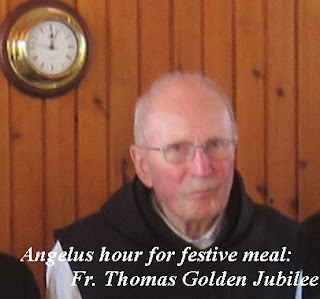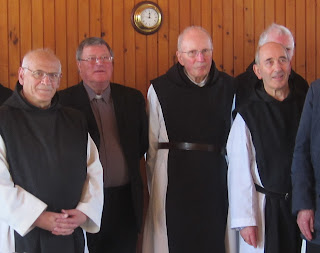Mass 20
June 2012-06-20
Month - Commemoration
of the Dead
The Night Office for this day of
Commemoration of the Dead, the Reading was from St. Bernard. Thoughts wandered
back to the Reading from the Refectory. It was about St. John Fisher. Vincent
Nichols Introduction ended with these words,
“We are told that on the morning of his execution 22nd July 1539, he was awakened by the prison officer at 5.00am and told that his execution was to be at 10.00am. He promptly asked to be allowed to sleep a few more hours!
“We are told that on the morning of his execution 22nd July 1539, he was awakened by the prison officer at 5.00am and told that his execution was to be at 10.00am. He promptly asked to be allowed to sleep a few more hours!
Herein lies his true greatness:
peace before God and witin himself. May his example continue to inspire us
today.” (+ Vincent Nichols November 2011)
His mother stood by the Cross
Sermons of St Bernard
The martyrdom of the Virgin Mary, implicit in Simeon's
prophecy, is put before us in the story of our Lord's passion. That venerable
old man, Simeon, said of the infant Jesus: 'This
child is set for a sign that will be contradicted' ; and to Mary: ‘A sword will pierce your soul.' Blessed
Mother, a sword did pierce your soul. For no sword could penetrate your Son's
flesh without piercing your soul. After your own son Jesus gave up his life–he
was yours in a special sense though he belongs to all–the cruel lance, which
opened his side and would not spare him in death though it could do him no
injury, could not touch his soul. But it pierced your soul. His soul was no
longer there, but yours could not be set free, and it was pierced by a sword of
sorrow. We rightly speak of you as more than a martyr, for the anguish of mind
you suffered exceeded all bodily pain.
'Mother, behold your son.' These words were more painful than a sword thrust for they
pierced your soul and touched the quick where soul is divided from spirit.
What an exchange! John was given to
you in place of Jesus, a disciple in place of the Master, a son of Zebedee in
place of the Son of God, a mere man in place of the true God. These words must
have pierced your loving soul, since just to recall them breaks our hearts,
hard and stony though they be.
Do not marvel, brethren, that Mary is
said to have endured martyrdom in her soul. Only he will marvel who forgets
what Paul said of the Gentiles, that among their worst vices was that they were
without compassion. Not so with Mary! May it never be so with those who
venerate her .
Someone may say: 'Did she not know in advance that her Son would die?' Without a
doubt. 'Did she not have sure hope in his
immediate resurrection?' Full confidence indeed. 'Did she then grieve when he was crucified?' Intensely. Who are
you, brother, and what sort of judgment is yours that you marvel at the grief
of Mary any more than that the Son of Mary should suffer? Could he die bodily
and she not share his death in her heart? Charity it was that moved him to
suffer death, charity greater than that of any man before or since: charity too
moved Mary, the like of which no mother has ever known.
































